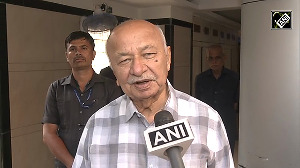Even though the civilian nuclear agreement between Canada and India was signed in Toronto on June 27 in the presence of Canadian Prime Ministers Stephen Harper and his Indian counterpart Dr Manmohan Singh, the Canadian companies do not have any authorisation as yet to export uranium or other nuclear materials to India.
They have to wait till the Nuclear Cooperation Agreement, as it is officially called, is ratified by the parliaments of the two countries, said an official spokesman of the Canadian Department of Foreign Affairs and International Trade.
The agreement 'hasn't come into force as yet,' the spokesman said in a written response to India Abroad's questions that were submitted through the prime minister's office.
"The signing of the NCA represented only one of the steps to move the agreed text to ratification and entry into force in both countries," he explained.
During his roundtable with a select group of mediaperons in Toronto on August 17, Prime Minister Harper said in an answer to a question from India Abroad that the NCA 'allows for a range of possible economic activity' and the economic activity, he explained, would be 'in support of the development of India's civilian nuclear energy capacity, which we anticipated will be rising enormously in the years to come.'
It was during his answers that the Canadian prime minister offered to ask his officials to answer further questions of India Abroad.
In the follow-up questions from your correspondent, DFAIT spokesman said 'although the nuclear industries in both Canada and India are free, and indeed encouraged, to commence with the exploration of possible areas of nuclear cooperation, (including the exportation of nuclear material, material and technology,) no export licenses to approve the physical export of nuclear items or technology can be issued until the NCA has been ratified and has entered into force.'
He noted, "All Canada's NCA are considered to be 'international treaty level' agreements and as such (are) subject to the prescribed legal procedures with regard to the conclusion and ratification of treaties."
Same is the case with India in regard to the international treaties, the spokesman explained.
The Canadian government has already drafted the legislation that will be presented in the next session of the parliament starting after the summer break.
Once the legislation is tabled in parliament, there could be some recommendations from the Opposition MPs. "In this instance there is, however, no legal obligation on Cabinet to act on any parliamentary recommendations," the spokesman stated.
In this regard, DFAIT spokesman claimed, "The procedure to table international treaties in parliament was adopted by the current (Conservative) government only in the interest of greater transparency."
This obviously is a political overtone given by the official spokesman.
After the parliamentary response to the draft legislation, Canadian Minister of Foreign
This process, the spokesman predicts, could 'take up to six weeks and it
is consequently not foreseen that Canada will be in a position to complete the ratification procedure before the end of 2010.'
Once ratification of the NCA has been completed in both Canada and India and formally conveyed to each other through diplomatic channels 'through Notes Verbal the dates on these Notes Verbal become the determining date for the entry into force of the NCA.'
Ottawa, the spokesman said, has already advised their high commissioner in New Delhi to keep a tab over the progress of the NCA ratification procedure by the Indian government and they are waiting for a response from him.
"All Canada's NCA's are furthermore accompanied by a so-called 'Administrative Arrangement' which are to be negotiated between the Canadian Nuclear Safety Commission and the nuclear regulator of the partner country in question," he said.
In case of NCA with India, AAs are to be called 'Appropriate Arrangement,' and NCA and AA are the responsibility of the Department of Atomic Energy, explained the Canadian government spokesman.
"AA's are non-binding documents," he said, "and as such enter into force upon signature (i.e. AA's are not/not subject to the same lengthy ratification procedures as the NCA) AA's are, however, required by the CNSC before any export permits (for uranium and other nuclear materials) will be approved to the country in question."
According to the Canadian government spokesman, "CNSC is currently waiting for a response from India's DAE to its invitation to commence with the negotiation of an AA."
Another question India Abroad asked was whether Indian officials could now travel to Canada to place purchase orders for uranium and other nuclear materials.
"While representatives of the Indian nuclear industry are welcome at this stage to explore contracts, all concerned would be well advised to make the validity of any such contracts signed dependant on the date of the actual entry into force of the NCA," the spokesman explained.
"The terms and conditions of all Canada's NCA's, including the one with India, are aimed at ensuring that nuclear cooperation with all partner countries comply with Canada's national and international nuclear non-proliferation legislation and obligations."
There was also a question from India Abroad whether there were any restrictions, if at all, as to what in the field of nuclear materials, the Canadian companies can't export to India.
"NCA are not/not commercial agreements and therefore do not per se specify or restrict specific items for or from trade," he stated.
India Abroad was not given access to the NCA agreement as 'public access to the text of the NCA remains embargoed until it has been tabled in Parliament,' he concluded.








 © 2025
© 2025